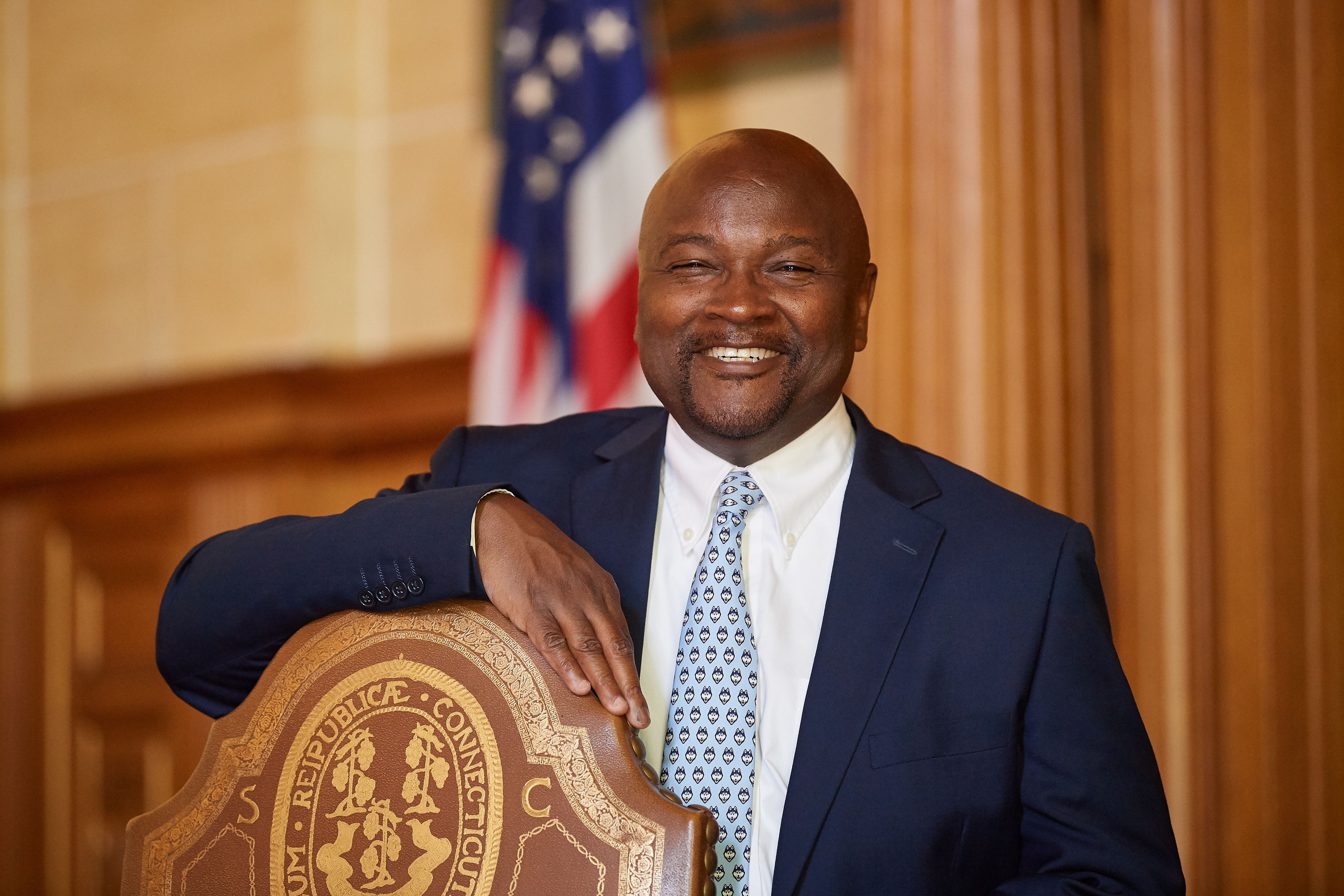UConn alumnus Richard A. Robinson, the first African-American Chief Justice of the Connecticut Supreme Court, will be the keynote speaker at the 2019 Dr. Martin Luther King Jr. Living Legacy Convocation on Thursday, Jan. 24, at 3:30 p.m. at the Jorgensen Center for the Performing Arts. The event is free and open to the public.
Learn more about Robinson from this profile that was first published in UConn Magazine’s fall 2018 edition.
Hail to the Chief: Richard Robinson ’79, State Supreme Court Chief Justice
“I was having dinner at home in the family room, watching television. My phone rings – a Stamford number that I didn’t recognize. I didn’t want to answer it, because I thought it was one of those robocalls,” says Richard Robinson ’79 (CLAS). “But my wife said to answer it.”
On the other end of the line was Gov. Dannell Malloy, saying that he would nominate Robinson to become Chief Justice of the Connecticut Supreme Court. “I kissed my wife and asked, ‘Did you find that different …?’ She said, ‘Why?’ I said, ‘I thought you might find it different – kissing a Supreme Court Chief Justice!’” Her reaction, he says with a laugh, “was loud.”
Liberal Arts
Such an accomplished legal career didn’t seem likely when Robinson first entered UConn in 1975. For one thing, he was an English major.
“I fell in love with Middle English and The Canterbury Tales,” he says. “I can still recite the intro.” Asked to prove it, he rattles off the first eight lines: “Whan that Aprille with his shoures soote / The droghte of Marche hath perced to the roote …”
Robinson, 60, spent his first three years at UConn Stamford so he could commute. He worked several part-time jobs to help pay for school, including driving the intra-campus bus. He transferred to Storrs his senior year, desiring “that true college experience,” and lived in the tight-knit, 50-person Jefferson Hall one semester.
“At Jefferson, we did a fundraiser for a charitable cause. We had this one bike going for a week, which we all had to ride for an hour at a time. The bike would go continuously around the campus,” Robinson recalls. “I seem to remember being assigned the 2 to 3 a.m. shift a lot.”
Sliding Doors
Graduating with a major in English and minor in ecology, Robinson told his mentor Ben Magubane, an anthropology professor who had been exiled from his own home country of South Africa, that he was considering law school. “That’s a waste of time. Go into medicine,” Magubane replied.
After much thought, Robinson decided on law school and graduated from the University of West Virginia in 1984. He roots for UConn sports to this day, though admits to feeling conflicted during the seasons when the two teams competed in the same Big East conference.
“After those games,” Robinson explains, “I would say I had rooted for whichever team won.”
Aisle Crossings
Working for 16 years as legal counsel for the city of Stamford and the Connecticut chapter of the NAACP, Robinson gained a reputation as a rare bipartisan figure in the state.
He was nominated for his first two lower court judgeships by two Republican governors, John Rowland and Jodi Rell, and then was nominated to the Supreme Court and later appointed Chief Justice by a Democratic governor. The politically divided Senate and House both confirmed his nomination unanimously.
Which ruling does he consider his most important during his court tenure?
“It’s always the last case that went out,” he says. “My view is this: No one case is more important than the other. For every litigant, that’s the most important case to them. That’s how a justice should think about it.
“So I tend not to watch the press coverage of cases when they’re issued,” Robinson continues, “because I don’t feel that’s the important part of it. It’s how it impacts the law, the jurisprudence, how it impacts the people who were involved in it. I don’t look at whether it’s popular or not.”
A 4th-degree black belt in karate, Robinson says he even practices with the UConn Karate Club from time to time, and laments that the group didn’t exist when he attended. His wife Nancy, however, is a 6th-degree black belt. “I have sparred with my wife a couple times, and she beat me every single time,” Robinson admits. “She’s too fast.”
Robinson says he hopes to lead the Connecticut Supreme Court for the next decade, until the state-mandated retirement for all judges at age 70.
“When I was 20, I probably thought that rule made a lot of sense,” Robinson says. “Now that I’m actually nearing 70, I don’t think it makes much sense at all.”



